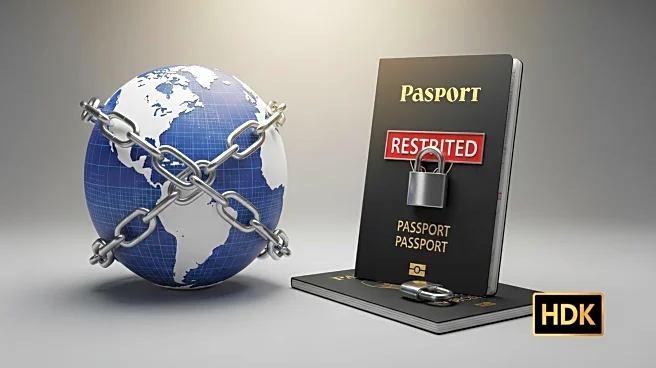What's Happening?
A man from Prince Edward Island, identified as Crowder, has been placed under a terrorism peace bond, which imposes strict conditions on his activities. The bond, effective for one year, includes 29 conditions such as prohibiting Crowder from accessing the internet or possessing devices capable of internet access, including smartphones. Additionally, Crowder is barred from applying for travel documents and must surrender any passports he currently holds. The peace bond was sought by police following Crowder's release in July, based on comments he made online and materials seized from his home. According to P.E.I. RCMP spokesman Cpl. Gavin Moore, the bond is considered the most appropriate action given the investigation's findings.
Why It's Important?
The imposition of a terrorism peace bond on Crowder highlights the ongoing efforts by law enforcement to prevent potential threats and ensure public safety. Such measures are significant as they reflect the balance between individual freedoms and national security concerns. The restrictions on internet access and travel documents aim to limit Crowder's ability to communicate or travel, potentially reducing the risk of harmful activities. This case underscores the challenges faced by authorities in addressing online radicalization and the importance of monitoring individuals who may pose a threat to society.
What's Next?
Crowder must comply with the conditions of the peace bond, which include carrying a copy of the document when leaving home and obtaining written consent for out-of-province travel. Failure to adhere to these conditions could result in further legal action. The situation may prompt discussions among policymakers and civil rights groups regarding the balance between security measures and individual rights. Additionally, the case may lead to increased scrutiny of online activities and the development of strategies to counteract radicalization.
Beyond the Headlines
The case raises ethical and legal questions about the use of peace bonds in preemptive security measures. It highlights the tension between safeguarding public safety and preserving individual freedoms, particularly in the digital age where online activities are closely monitored. The restrictions on internet access may also spark debates on privacy rights and the extent to which authorities can intervene in personal communications.









